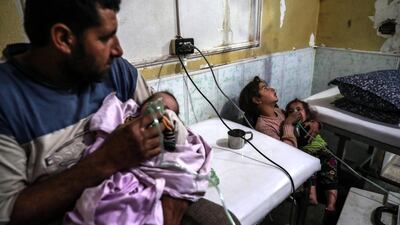Two dozen countries agreed on Tuesday to push for sanctions against perpetrators of chemical attacks in Syria, with US secretary of state Rex Tillerson saying Russia “ultimately bears responsibility” for such strikes.
Twenty-four nations approved a new “partnership against impunity” for the use of chemical weapons, just a day after reports they were used in an attack that sickened 21 people in rebel-held Eastern Ghouta, which Mr Tillerson said was suspected to involve chlorine.
“Whoever conducted the attacks, Russia ultimately bears responsibility for the victims in East Ghouta and countless other Syrians targeted with chemical weapons since Russia became involved in Syria,” he said after the international meeting in Paris, and ahead of further talks with ministers from several countries on ending the conflict.
“There is simply no denying that Russia, by shielding its Syrian ally, has breached its commitments to the US as a framework guarantor,” overseeing the destruction of Syria's chemical weapons stockpiles, as agreed in September 2013, Mr Tillerson said.
Despite its pledge to destroy such weapons, the Syrian regime has been repeatedly been accused of staging chemical attacks, with the United Nations among those blaming it for an April 2017 sarin gas attack on the opposition-held village of Khan Sheikhun which left scores dead.
There have been at least 130 separate chemical weapons attacks in Syria since 2012, according to French estimates, with the ISIL group also accused of using mustard gas in Syria and Iraq.
Russia twice used its UN veto in November to block an extension of an international expert inquiry into chemical attacks in Syria, to the consternation of western powers.
Moscow, backed by Iran and Turkey, has organised talks in the Russian city of Sochi next week aimed at finding a resolution to the multifaceted civil war.
Those efforts are running parallel to talks overseen by the UN, with the latest round due in Vienna on Thursday and Friday.
The talks have so far failed to make progress towards ending the war that has left more than 340,000 people dead.
Mr Tillerson said that “Russia’s failure to resolve the chemical weapons issue in Syria calls into question its relevance to the resolution of the overall crisis”.
“At a bare minimum, Russia must stop vetoing, or at the very least abstain, from future Security Council votes on this issue,” he said.
At Tuesday’s meeting, 24 out of 29 countries attending committed to sharing information and compiling a list of individuals implicated in the use of chemical weapons in Syria and beyond.
These could then be hit with sanctions such as asset freezes and entry bans as well as criminal proceedings at the national level.
Ahead of the meeting France announced asset freezes against 25 Syrian companies and executives, as well as French, Lebanese and Chinese businesses accused of aiding the regime's use of chemical weapons.
“The criminals who take the responsibility for using and developing these barbaric weapons must know that they will not go unpunished,” said French foreign minister Jean-Yves Le Drian, who chaired Tuesday’s meeting. “The current situation cannot continue.”
Mr Tillerson, Mr Le Drian and several other ministers including Britain’s Boris Johnson were meeting for further talks laying the groundwork for a new contact group on Syria that French president Emmanuel Macron has been urging for months.
Mr Macron wants the new group to bring together the five permanent members of the UN Security Council – Britain, China, France, Russia and the US – along with regional countries to find a solution.
Mr Johnson said he was also set to host his US, Saudi Arabian and UAE counterparts at the British Embassy to discuss the Yemen conflict in a whirlwind of Middle Eastern diplomacy.
“The conflicts in Syria and Yemen have created two of the worst humanitarian crises of our time,” an aide to Mr Le Drian said.
“There can be no military solution to either conflict, only peaceful and carefully negotiated political solutions will truly end the suffering.”
The Syrian war has grown even more complex in recent days with Turkey launching a new ground operation against Kurdish militia who it considers an offshoot of the outlawed Kurdistan Workers' Party (PKK).
Mr Tillerson met with Turkish foreign minister Mevlut Cavusoglu in Paris on Tuesday.
Last week, Mr Tillerson had warned that the US would remain in Syria until the situation was stable enough to remove president Bashar Al Assad from office.

